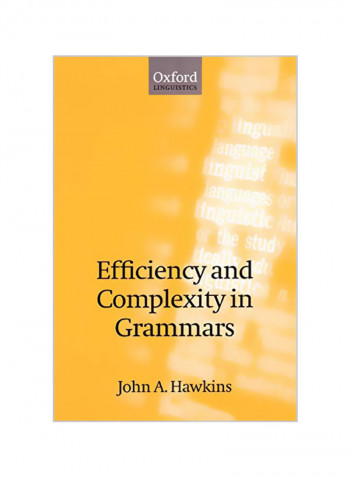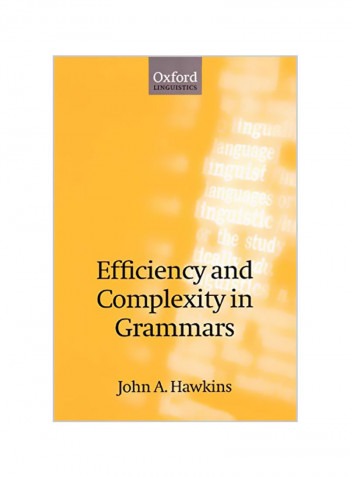Efficiency And Complexity In Grammars Paperback
Recommend
Sort by
Rating
Date
Specifications
Author 1
John A. Hawkins
Book Description
This book addresses a question fundamental to any discussion of grammatical theory and grammatical variation: to what extent can principles of grammar be explained through language use? John A. Hawkins argues that there is a profound correspondence between performance data and the fixed conventions of grammars. Preferences and patterns found in the one, he shows, are reflected in constraints and variation patterns in the other. The theoretical consequences of theproposed 'performance-grammar correspondence hypothesis' are far-reaching - for current grammatical formalisms, for the innateness hypothesis, and for psycholinguistic models of performance and learning. Drawing on empirical generalizations and insights from language typology, generative grammar,psycholinguistics, and historical linguistics, Professor Hawkins demonstrates that the assumption that grammars are immune to performance is false. He presents detailed empirical case studies and arguments for an alternative theory in which performance has shaped the conventions of grammars and thus the variation patterns found in the world's languages. The innateness of language, he argues, resides primarily in the mechanisms human beings have for processing and learning it.This important book will interest researchers in linguistics (including typology and universals, syntax, grammatical theory, historical linguistics, functional linguistics, and corpus linguistics), psycholinguistics (including parsing, production, and acquisition), computational linguistics (including language-evolution modelling and electronic corpus development); and cognitive science (including the modeling of the performance-competence relationship, pragmatics, and relevancetheory).
ISBN-13
9780199252695
Language
English
Publisher
OUP Oxford
Publication Date
13-01-2005
Number of Pages
328
About the Author
John A. Hawkins completed his PhD at Cambridge University in 1975. He has held positions at the University of Essex, the Max-Planck-Institute for Psycholinguistics, and the University of Southern California. In 2003 he was elected to a chair at Cambridge. His visiting appointments include UCLA, Berkeley, Potsdam, and the Max-Planck-Institute for Evolutionary Anthropology. He has research interests in linguistics and cognitive science and has published books and articles on typology and universals, syntax and grammatical theory, and psycholinguistics and historical linguistics. Recently, his particular focus has been the relationship between principles of language use and grammars. His books include A Performance Theory of Order and Constituency (Cambridge, 1994); A Comparative Typology of English and German (Austin, 1986) Word Order Universals (New York, 1983), Definiteness, and Indefiniteness: A Study in Reference and Grammaticality Prediction (London, 1978).
Editorial Review
Hawkins argues that grammars are profoundly affected by the way humans process language. He develops a simple but elegant theory of performance and grammar by drawing on concepts and data from generative grammar, linguistic typology, experimental psycholinguistics and historical linguistics. In so doing, he also makes a laudable attempt to bridge the schism between the two research traditions in linguistics, the formal and the functional. Efficiency and Complexity in Grammars is a major contribution with far-reaching consequences and implications for many of the fundamental issues in linguistic theory. This is a tremendous piece of scholarship that no linguist can afford to neglect. Jae Jung Song, University of Otago, New Zealand Efficiency and Complexity in Grammars is a landmark work, setting a new standard in the study of the relationship between linguistic competence and performance. Tom Wasow, Stanford University Jack Hawkins has long been a trail-blazer in the attempt to reconcile the results of formal and functional linguistics. Efficiency and Complexity in Grammars charts new territory in this domain. The book argues persuasively that a small number of performance-based principles combine to account for many grammatical constraints proposed by formal linguists and also explain the origins of numerous typological generalizations discovered by functionalists. Frederick J. Newmeyer, University of Washington




